外研版必修2 Module 3 Music Reading and Vocabulary课件(60张ppt)
文档属性
| 名称 | 外研版必修2 Module 3 Music Reading and Vocabulary课件(60张ppt) |

|
|
| 格式 | zip | ||
| 文件大小 | 2.5MB | ||
| 资源类型 | 教案 | ||
| 版本资源 | 外研版 | ||
| 科目 | 英语 | ||
| 更新时间 | 2022-01-28 00:00:00 | ||
图片预览

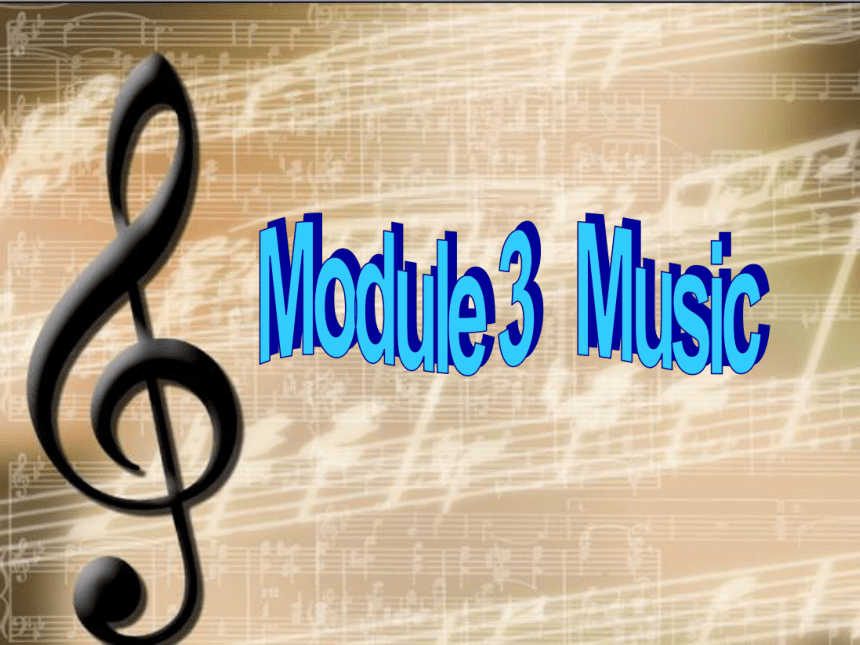
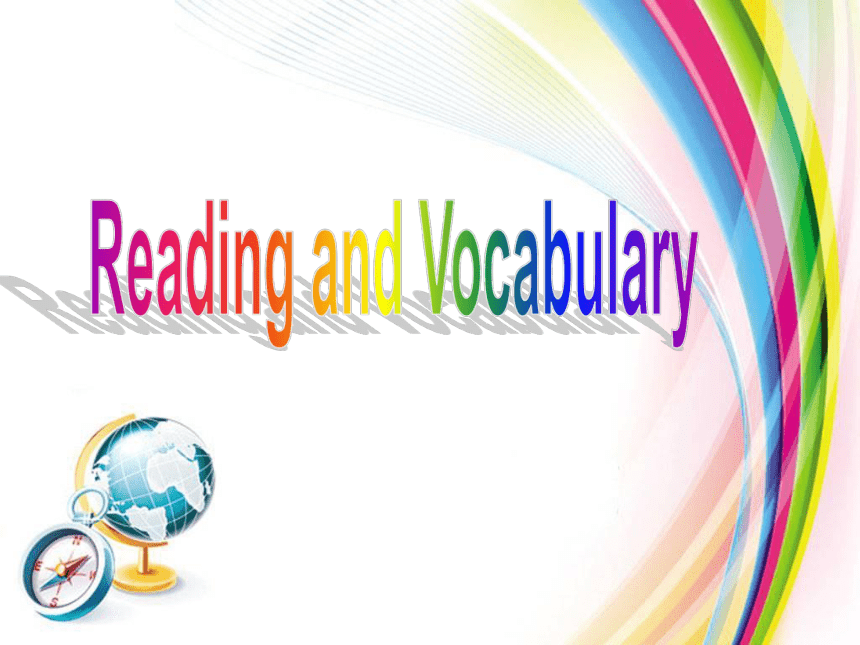
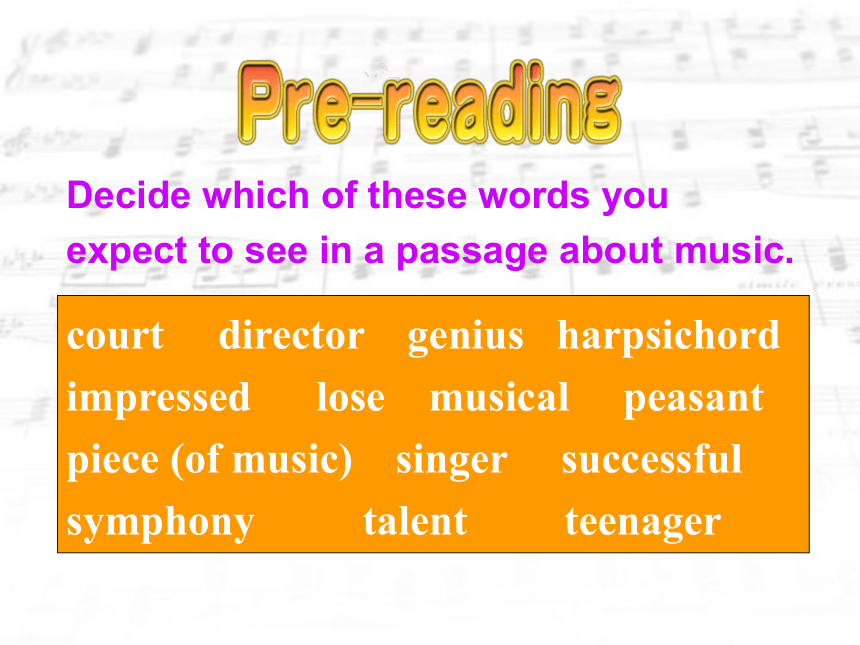
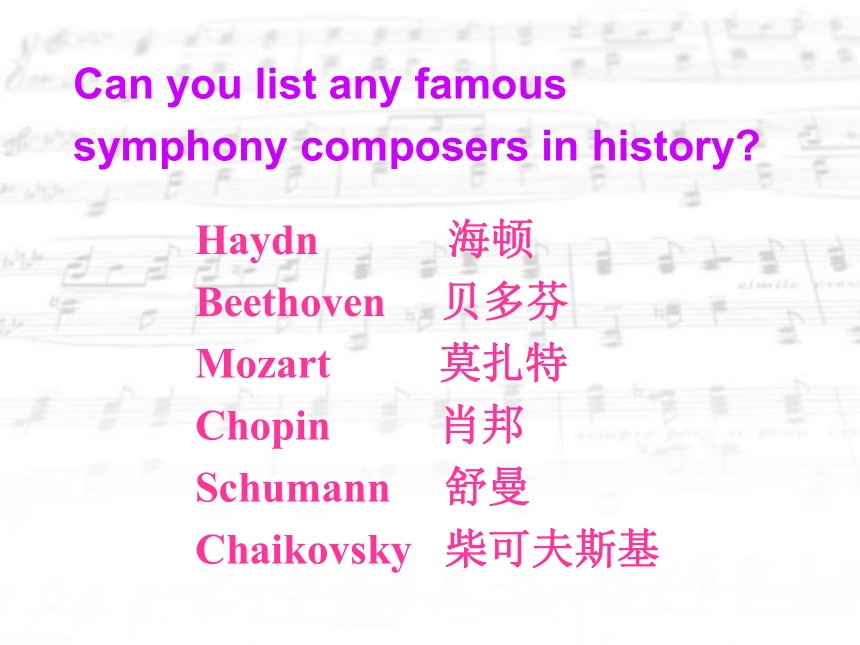
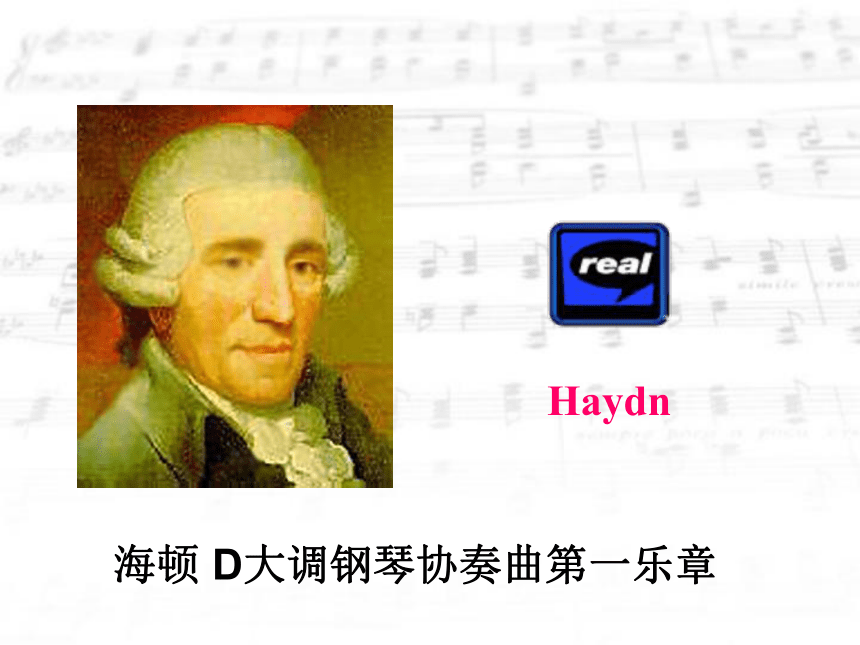
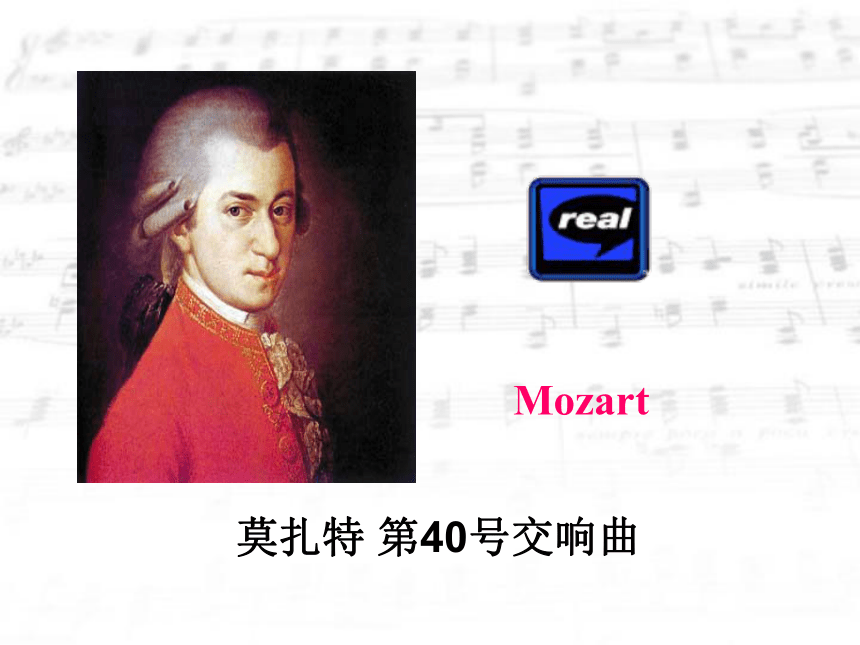
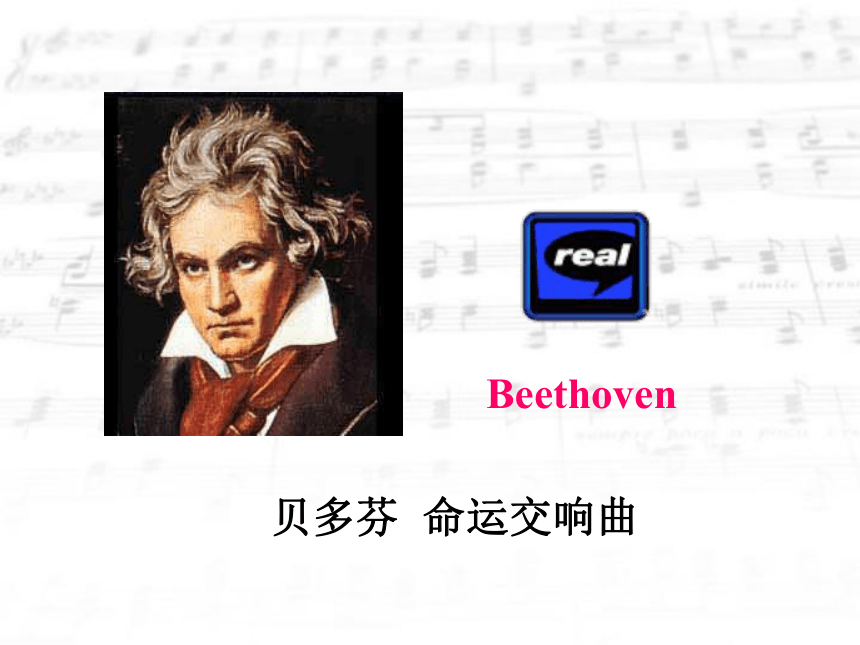

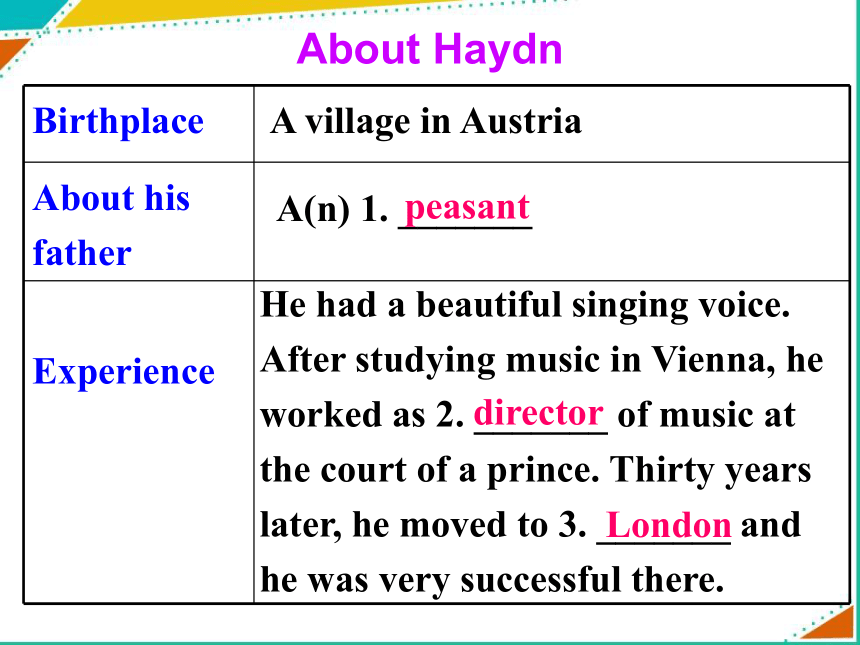
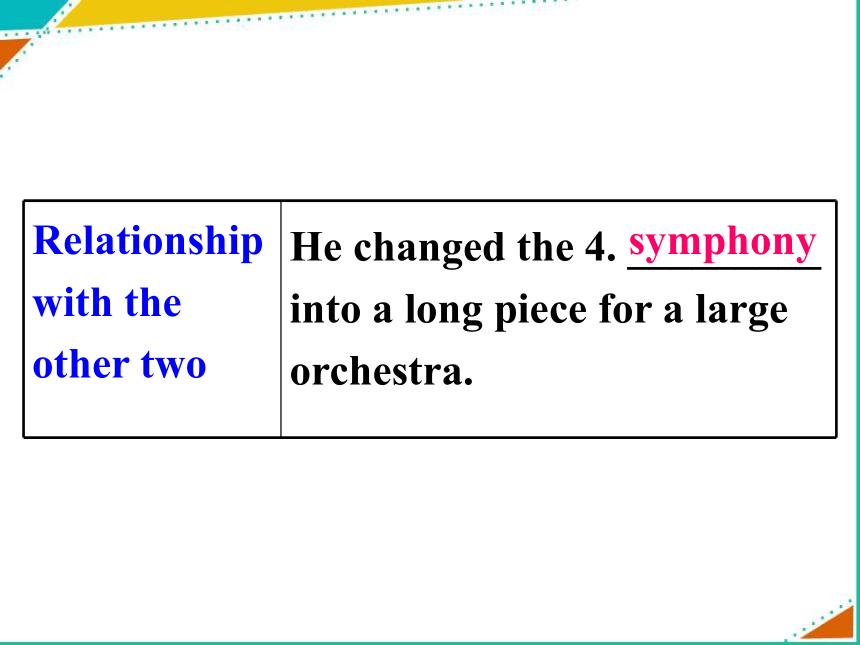
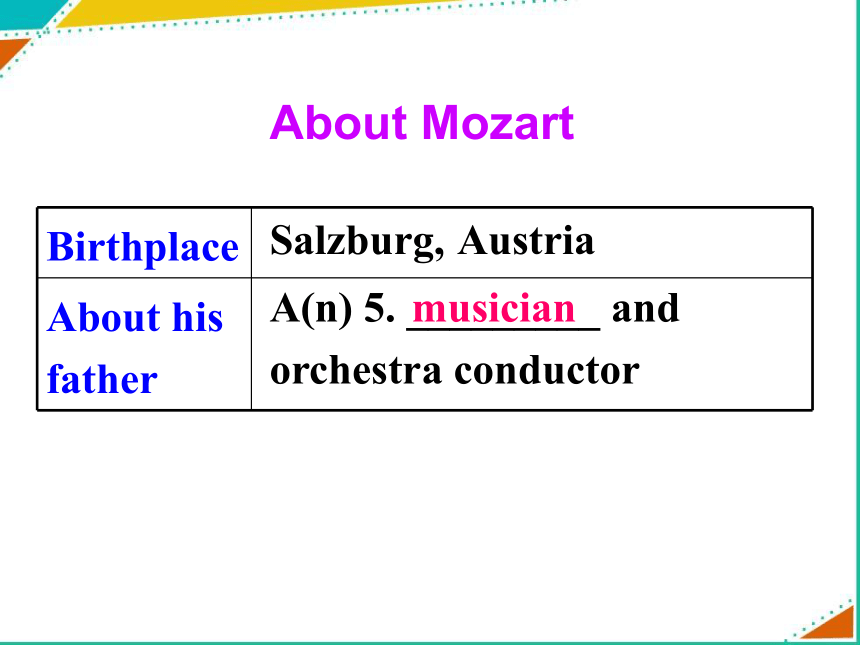
文档简介
(共60张PPT)
Decide which of these words you expect to see in a passage about music.
court director genius harpsichord impressed lose musical peasant piece (of music) singer successful symphony talent teenager
Can you list any famous symphony composers in history
Haydn 海顿
Beethoven 贝多芬
Mozart 莫扎特
Chopin 肖邦
Schumann 舒曼
Chaikovsky 柴可夫斯基
Haydn
海顿 D大调钢琴协奏曲第一乐章
Mozart
莫扎特 第40号交响曲
Beethoven
贝多芬 命运交响曲
Birthplace
About his father
Experience
About Haydn
A village in Austria
A(n) 1. _______
He had a beautiful singing voice. After studying music in Vienna, he worked as 2. _______ of music at the court of a prince. Thirty years later, he moved to 3. _______ and he was very successful there.
peasant
director
London
Relationship with the other two
He changed the 4. _________ into a long piece for a large orchestra.
symphony
Birthplace
About his father
Salzburg, Austria
A(n) 5. _________ and orchestra conductor
musician
About Mozart
Experience
From a very early age: had musical talent At 4: learned to play the harpsichord At 5: started 6. ________________ At 6: played the harpsichord in a concert for the Empress of Austria By 14: had composed many pieces In 1781: met Haydn and became friends
composing music
Achievement
He composed more than 7. __________ of music.
600 pieces
Birthplace
About his father
Bonn, Germany
A(n) 8. ______
singer
About Beethoven
Experience
.
Achievement
He composed many pieces of famous music.
Very young: showed musical talent
In 1791: met Haydn and Haydn 9. __________ him to move to Vienna For the rest of his life: became very popular in Vienna and stayed there During the last years of his life: went 10. ____ but continued composing.
deaf
encouraged
1. Haydn had worked in Austria for _____ years before he moved to London.
2. Mozart lived _____ years of life.
Fill in the blanks with the numbers in the box.
1781, 1770, 35, 14, 6, 30, 5, 1791, 4, 600
30
35
1781, 1770, 35, 14, 6, 30, 5, 1791, 4, 600
3. Beethoven was born in Bonn, Germany in the year _____.
4. Mozart began to learn playing the musical instrument at the age of ___.
5. Haydn and Mozart met each other in the year ______.
6. Mozart began composing music at _____.
1770
4
1781
5
1781, 1770, 35, 14, 6, 30, 5, 1791, 4, 600
7. Beethoven met Haydn in the year _____.
8. By the age of ___, Mozart had composed many pieces of music.
9. Mozart played the harpsichord for the Empress of Austria when he was ___.
10. Mozart composed more than ______
pieces of music all his life.
600
1791
14
6
Decide whether the following
statements are true (T) or false (F).
1. There was no one composing symphony before Haydn.
2. Haydn moved to Nienna to work as a director of music.
3. Mozart had a good voice for singing when he was young.
4. Mozart was influenced by his father from an early age.
5. Mozart could only compose music for the harpsichord.
6. Haydn praised Mozart highly for his talent.
7. Beethoven's father taught him to play the violin when he was young.
8. Beethoven said he learned a lot from Haydn.
9. Haydn advised Beethoven to go to Vienna for a better future.
10. Beethoven could still continue
composing music after he became
completely deaf.
1. Complete the following sentences
by yourselves.
1) Haydn changed the symphony into
_____________________________.
2) __________________ for 30 years,
Haydn ________ London, _____ he
was very successful.
a long piece for a large orchestra
Having worked there
moved to
where
3) Wolfgang ________________ from a very early age.
4) Mozart ______________________ when he was five, and played for the Empress of Austria ______________.
5) _____ he was still a teenager, Mozart was already ________ and ______ Europe giving concerts.
started composing music
While
a big star
toured
when he was six
had musical talent
6) Beethoven ____________________ when he was very young.
7) ________________ encouraged Beethoven to move to Vienna.
showed musical talent
It was Haydn who
2. Which of the three composers impressed you the most Why
3. What can you learn from the composers
talent
1) She showed / had a talent for acting at an early age.
talent n 天赋, 才智
常和介词for搭配, 在本句中为可数
名词。
2) John had little talent for expressing himself in writing.
在本句中, talent为不可数名词。
3) There was plenty of talent at the party last night.
4) The company is always looking for
new talent.
talent n. 有才能的人, 天才
这时多作不可数名词。
【拓展】
a man / woman of many talents
多才多艺的男子/女子
a talent show / competition / contest
新秀演出/选拔赛/大奖赛
talent scout 人才发掘者, 星探
talented adj. 有天赋的, 天才的
lose
1) They played so badly that they lost the game.
lose v. 输, 失败
2) I can’t open the door because I have lost my key.
lose v. 丢失, 失去
3) We lost $200 on that job.
lose v. 损失
4) Come, there is no time to lose.
lose v. 耽搁, 浪费
【拓展】
与lose相关的短语有:
lose heart 灰心
lose face 丢脸
lose weight 减轻体重
lose touch with sb. 与某人失去联系
lose one’s temper 发脾气
lose one’s way 迷路
【链接】
loser n. 输家,失败者
loss n. 损失,亏损
at a loss 不知所措
lost adj. 失去的,迷惑的
get lost 迷路
1. be known as 作为……而出名
be known for 因……而出名
be known to 为……所知
1) Joseph Haydn is known as “the
father of the symphony”.
2) Chaplin was known for his silent
films and this is known to us all.
2. After studying music in Vienna, Haydn went to work at the court of a prince in eastern Austria…
在维也纳学习音乐之后,海顿去奥地利东部一个王子的宫廷工作……
After studying music in Vienna…
=After he studied music in Vienna…
=Having studied music in Vienna…
Having worked there for 30 years, Haydn moved to London…
2) Having worked… =After Haydn
had worked…
现在分词的一般式作状语,表示动作与谓语动词同时发生;现在分词的完成形式作状语,表示动作发生在谓语动词前在以上两个句子中, v.-ing作时间状语且其逻辑主语必须和主句的主语保持一致。
e.g. ______ such heavy pollution
already, it may be too late to clean
up the river.
A. Having been suffered
B. Having suffered
C. Suffered
D. Suffering
解析:由already可知suffer动作已完
成,the river与suffer之间为主动关系,故答案为B。
3. By the time he was 14, Mozart had composed many pieces for the harpsichord, piano and violin, as well as for orchestras.
莫扎特到14岁的时候,不仅已经谱写了很多管弦乐曲,还谱写了许多拔弦键琴曲、钢琴曲和小提琴曲。
by the time 到……为止
由by the time引导的时间状语从句,注意时态的变化:在一般情况下,如果从句的谓语动词用一般过去时,主句的谓语动词用过去完成时;如果从句的谓语动词用一般现在时,主句的谓语动词用将来完成时。
e.g. By the time you came back, I had
finished writing this book.
到你回来时, 我已经写完这本书了。
By the time you come here tomorrow,
I will have finished this work.
你明天来这儿的时候, 我将已经完成
此工作了。
4. 归纳下列句中的语法现象:
1) It was Haydn who encouraged Beethoven to move to Vienna.
2) It was in 1990 that I graduated from the university.
3) Was it in the morning that you saw Joe in the street
4) Who was it that you want to send to the front
1) 以上句子都是强调句型, 其基本结构
为: it is/was +被强调部分+that+其
他。被强调部分是人时可以用who代
替that。
2) 一般疑问句的强调结构句型为: Is/Was
it +被强调部分 + that / who... 如:
Was it my brother who told you this
3) 特殊疑问句的强调结构句型为:特殊
疑问词 (Who / What / When / Where
/Why / How...)+is / was it that... 如:
Why was it that Li Lei came late
again
这类强调结构置于从句中时应使用陈
述语序:
The question is who it is that we can
trust.
4) 对not...until...句式的强调有固定的句
型, 即It is / was not until ... That ...。
It was not until I saw her that got the
news.
5. As he grew older, he began to go deaf.
随着年龄的增长,他的耳朵变聋了。
go +adj. 往往表示事物由好向坏的变化。
e.g. The young girl went mad at the terrible news.
Her hair is going gray.
The children went wild with excitement.
对比:
1) The sky grew dark and it began to rain.
2) Jack is growing taller and taller year by year.
3) Spring comes and it is getting warmer and warmer.
4) This unit has become more advanced than before.
Sentence Explanations
1. He learned to play the harpsichord when he was four, he started composing music when he was five, and when he was six, he played the harpsichord in a concert for the Empress of Austria.
【分析】
①本句是一个包含三个并列分句的并列复
合句。
②三个并列分句中的谓语动词分别为
learned, started和________。
③每个分句中都含有一个由when引导的
时间状语从句。
【句意】他(莫扎特)四岁时会弹拨弦键琴,五岁时开始作曲,六岁时就在一场音乐会上为奥地利皇后演奏拨弦键琴。
played
【仿写】我弟弟十岁时学习画画,十八岁上大学学习美术,二十二岁毕业。
_________________________________ _________________________________________________________________
________________________________
_________________________________
My little brother learned to paint when he was ten, he went to college to study painting when he was eighteen, and when he was twenty-two, he graduated.
2. He showed musical talent when he was very young, and learned to play the violin and piano from his father, who was a singer.
【分析】 ①本句是一个主从复合句。
②第一个and连接主句的并列谓语动词
showed和learned。
③when引导时间状语从句; who引导非限制性定语从句, 修饰先行词__________。
his father
【句意】他(贝多芬)年少时就显示出音乐才华。他父亲是位歌唱家,他从父亲那里学会了拉小提琴以及弹钢琴。
【仿写】苏珊八岁时开始喜欢弹钢琴。
她母亲是位钢琴家,她从母亲那里学会
了弹钢琴。 ___________________________________
___________________________________
___________________________________
Susan started to like playing the piano when she was 8, and learned to play the piano from her mother, who was a pianist.
根据括号内所给汉语提示完成下列句
子,每空一词。
1. He __________ _______ (继续做) the experiment although he didn’t have a rest for two days.
2. Hard as the metal is, it can be _______ ____ (变成) liquid at high temperature.
continued doing
changed
into
3. She __ ____ __ (和) the other students has known this method.
4. After reading the book, he was so _________ _______ (印象深刻) it that he immediately got in touch with the young author.
5. As is known to us all, he ______ ______ ______ (表现出了音乐天赋) when he was young.
as well as
impressed with/by
talent
showed musical
6. Only through communication can we _____ _____ _____ ______ (互相学习) and come to know each other better.
7. When my grandmother was nineteen months old, she fell ill and had a fever. Then she ____ ____ (变聋).
learn from each other
went deaf
8. ___ ____ __ (其余的) the money was spent in one day.
9. He is recognized as one of the greatest scientists __ __ ____ (有史以来).
10. The little boy ___ ___ ____ (失明) after three years’ illness.
The rest of
of all time
lost his sight
1. What can you learn from the composers
2. Finish the exercises in the workbook.
Decide which of these words you expect to see in a passage about music.
court director genius harpsichord impressed lose musical peasant piece (of music) singer successful symphony talent teenager
Can you list any famous symphony composers in history
Haydn 海顿
Beethoven 贝多芬
Mozart 莫扎特
Chopin 肖邦
Schumann 舒曼
Chaikovsky 柴可夫斯基
Haydn
海顿 D大调钢琴协奏曲第一乐章
Mozart
莫扎特 第40号交响曲
Beethoven
贝多芬 命运交响曲
Birthplace
About his father
Experience
About Haydn
A village in Austria
A(n) 1. _______
He had a beautiful singing voice. After studying music in Vienna, he worked as 2. _______ of music at the court of a prince. Thirty years later, he moved to 3. _______ and he was very successful there.
peasant
director
London
Relationship with the other two
He changed the 4. _________ into a long piece for a large orchestra.
symphony
Birthplace
About his father
Salzburg, Austria
A(n) 5. _________ and orchestra conductor
musician
About Mozart
Experience
From a very early age: had musical talent At 4: learned to play the harpsichord At 5: started 6. ________________ At 6: played the harpsichord in a concert for the Empress of Austria By 14: had composed many pieces In 1781: met Haydn and became friends
composing music
Achievement
He composed more than 7. __________ of music.
600 pieces
Birthplace
About his father
Bonn, Germany
A(n) 8. ______
singer
About Beethoven
Experience
.
Achievement
He composed many pieces of famous music.
Very young: showed musical talent
In 1791: met Haydn and Haydn 9. __________ him to move to Vienna For the rest of his life: became very popular in Vienna and stayed there During the last years of his life: went 10. ____ but continued composing.
deaf
encouraged
1. Haydn had worked in Austria for _____ years before he moved to London.
2. Mozart lived _____ years of life.
Fill in the blanks with the numbers in the box.
1781, 1770, 35, 14, 6, 30, 5, 1791, 4, 600
30
35
1781, 1770, 35, 14, 6, 30, 5, 1791, 4, 600
3. Beethoven was born in Bonn, Germany in the year _____.
4. Mozart began to learn playing the musical instrument at the age of ___.
5. Haydn and Mozart met each other in the year ______.
6. Mozart began composing music at _____.
1770
4
1781
5
1781, 1770, 35, 14, 6, 30, 5, 1791, 4, 600
7. Beethoven met Haydn in the year _____.
8. By the age of ___, Mozart had composed many pieces of music.
9. Mozart played the harpsichord for the Empress of Austria when he was ___.
10. Mozart composed more than ______
pieces of music all his life.
600
1791
14
6
Decide whether the following
statements are true (T) or false (F).
1. There was no one composing symphony before Haydn.
2. Haydn moved to Nienna to work as a director of music.
3. Mozart had a good voice for singing when he was young.
4. Mozart was influenced by his father from an early age.
5. Mozart could only compose music for the harpsichord.
6. Haydn praised Mozart highly for his talent.
7. Beethoven's father taught him to play the violin when he was young.
8. Beethoven said he learned a lot from Haydn.
9. Haydn advised Beethoven to go to Vienna for a better future.
10. Beethoven could still continue
composing music after he became
completely deaf.
1. Complete the following sentences
by yourselves.
1) Haydn changed the symphony into
_____________________________.
2) __________________ for 30 years,
Haydn ________ London, _____ he
was very successful.
a long piece for a large orchestra
Having worked there
moved to
where
3) Wolfgang ________________ from a very early age.
4) Mozart ______________________ when he was five, and played for the Empress of Austria ______________.
5) _____ he was still a teenager, Mozart was already ________ and ______ Europe giving concerts.
started composing music
While
a big star
toured
when he was six
had musical talent
6) Beethoven ____________________ when he was very young.
7) ________________ encouraged Beethoven to move to Vienna.
showed musical talent
It was Haydn who
2. Which of the three composers impressed you the most Why
3. What can you learn from the composers
talent
1) She showed / had a talent for acting at an early age.
talent n 天赋, 才智
常和介词for搭配, 在本句中为可数
名词。
2) John had little talent for expressing himself in writing.
在本句中, talent为不可数名词。
3) There was plenty of talent at the party last night.
4) The company is always looking for
new talent.
talent n. 有才能的人, 天才
这时多作不可数名词。
【拓展】
a man / woman of many talents
多才多艺的男子/女子
a talent show / competition / contest
新秀演出/选拔赛/大奖赛
talent scout 人才发掘者, 星探
talented adj. 有天赋的, 天才的
lose
1) They played so badly that they lost the game.
lose v. 输, 失败
2) I can’t open the door because I have lost my key.
lose v. 丢失, 失去
3) We lost $200 on that job.
lose v. 损失
4) Come, there is no time to lose.
lose v. 耽搁, 浪费
【拓展】
与lose相关的短语有:
lose heart 灰心
lose face 丢脸
lose weight 减轻体重
lose touch with sb. 与某人失去联系
lose one’s temper 发脾气
lose one’s way 迷路
【链接】
loser n. 输家,失败者
loss n. 损失,亏损
at a loss 不知所措
lost adj. 失去的,迷惑的
get lost 迷路
1. be known as 作为……而出名
be known for 因……而出名
be known to 为……所知
1) Joseph Haydn is known as “the
father of the symphony”.
2) Chaplin was known for his silent
films and this is known to us all.
2. After studying music in Vienna, Haydn went to work at the court of a prince in eastern Austria…
在维也纳学习音乐之后,海顿去奥地利东部一个王子的宫廷工作……
After studying music in Vienna…
=After he studied music in Vienna…
=Having studied music in Vienna…
Having worked there for 30 years, Haydn moved to London…
2) Having worked… =After Haydn
had worked…
现在分词的一般式作状语,表示动作与谓语动词同时发生;现在分词的完成形式作状语,表示动作发生在谓语动词前在以上两个句子中, v.-ing作时间状语且其逻辑主语必须和主句的主语保持一致。
e.g. ______ such heavy pollution
already, it may be too late to clean
up the river.
A. Having been suffered
B. Having suffered
C. Suffered
D. Suffering
解析:由already可知suffer动作已完
成,the river与suffer之间为主动关系,故答案为B。
3. By the time he was 14, Mozart had composed many pieces for the harpsichord, piano and violin, as well as for orchestras.
莫扎特到14岁的时候,不仅已经谱写了很多管弦乐曲,还谱写了许多拔弦键琴曲、钢琴曲和小提琴曲。
by the time 到……为止
由by the time引导的时间状语从句,注意时态的变化:在一般情况下,如果从句的谓语动词用一般过去时,主句的谓语动词用过去完成时;如果从句的谓语动词用一般现在时,主句的谓语动词用将来完成时。
e.g. By the time you came back, I had
finished writing this book.
到你回来时, 我已经写完这本书了。
By the time you come here tomorrow,
I will have finished this work.
你明天来这儿的时候, 我将已经完成
此工作了。
4. 归纳下列句中的语法现象:
1) It was Haydn who encouraged Beethoven to move to Vienna.
2) It was in 1990 that I graduated from the university.
3) Was it in the morning that you saw Joe in the street
4) Who was it that you want to send to the front
1) 以上句子都是强调句型, 其基本结构
为: it is/was +被强调部分+that+其
他。被强调部分是人时可以用who代
替that。
2) 一般疑问句的强调结构句型为: Is/Was
it +被强调部分 + that / who... 如:
Was it my brother who told you this
3) 特殊疑问句的强调结构句型为:特殊
疑问词 (Who / What / When / Where
/Why / How...)+is / was it that... 如:
Why was it that Li Lei came late
again
这类强调结构置于从句中时应使用陈
述语序:
The question is who it is that we can
trust.
4) 对not...until...句式的强调有固定的句
型, 即It is / was not until ... That ...。
It was not until I saw her that got the
news.
5. As he grew older, he began to go deaf.
随着年龄的增长,他的耳朵变聋了。
go +adj. 往往表示事物由好向坏的变化。
e.g. The young girl went mad at the terrible news.
Her hair is going gray.
The children went wild with excitement.
对比:
1) The sky grew dark and it began to rain.
2) Jack is growing taller and taller year by year.
3) Spring comes and it is getting warmer and warmer.
4) This unit has become more advanced than before.
Sentence Explanations
1. He learned to play the harpsichord when he was four, he started composing music when he was five, and when he was six, he played the harpsichord in a concert for the Empress of Austria.
【分析】
①本句是一个包含三个并列分句的并列复
合句。
②三个并列分句中的谓语动词分别为
learned, started和________。
③每个分句中都含有一个由when引导的
时间状语从句。
【句意】他(莫扎特)四岁时会弹拨弦键琴,五岁时开始作曲,六岁时就在一场音乐会上为奥地利皇后演奏拨弦键琴。
played
【仿写】我弟弟十岁时学习画画,十八岁上大学学习美术,二十二岁毕业。
_________________________________ _________________________________________________________________
________________________________
_________________________________
My little brother learned to paint when he was ten, he went to college to study painting when he was eighteen, and when he was twenty-two, he graduated.
2. He showed musical talent when he was very young, and learned to play the violin and piano from his father, who was a singer.
【分析】 ①本句是一个主从复合句。
②第一个and连接主句的并列谓语动词
showed和learned。
③when引导时间状语从句; who引导非限制性定语从句, 修饰先行词__________。
his father
【句意】他(贝多芬)年少时就显示出音乐才华。他父亲是位歌唱家,他从父亲那里学会了拉小提琴以及弹钢琴。
【仿写】苏珊八岁时开始喜欢弹钢琴。
她母亲是位钢琴家,她从母亲那里学会
了弹钢琴。 ___________________________________
___________________________________
___________________________________
Susan started to like playing the piano when she was 8, and learned to play the piano from her mother, who was a pianist.
根据括号内所给汉语提示完成下列句
子,每空一词。
1. He __________ _______ (继续做) the experiment although he didn’t have a rest for two days.
2. Hard as the metal is, it can be _______ ____ (变成) liquid at high temperature.
continued doing
changed
into
3. She __ ____ __ (和) the other students has known this method.
4. After reading the book, he was so _________ _______ (印象深刻) it that he immediately got in touch with the young author.
5. As is known to us all, he ______ ______ ______ (表现出了音乐天赋) when he was young.
as well as
impressed with/by
talent
showed musical
6. Only through communication can we _____ _____ _____ ______ (互相学习) and come to know each other better.
7. When my grandmother was nineteen months old, she fell ill and had a fever. Then she ____ ____ (变聋).
learn from each other
went deaf
8. ___ ____ __ (其余的) the money was spent in one day.
9. He is recognized as one of the greatest scientists __ __ ____ (有史以来).
10. The little boy ___ ___ ____ (失明) after three years’ illness.
The rest of
of all time
lost his sight
1. What can you learn from the composers
2. Finish the exercises in the workbook.
